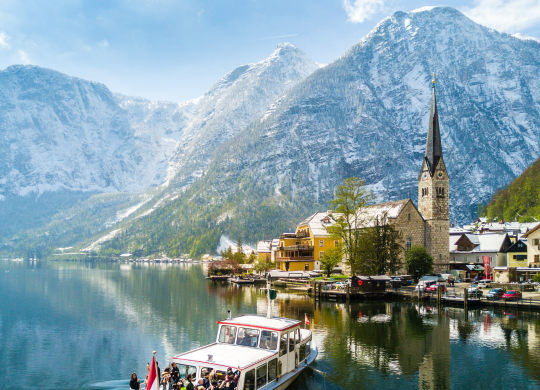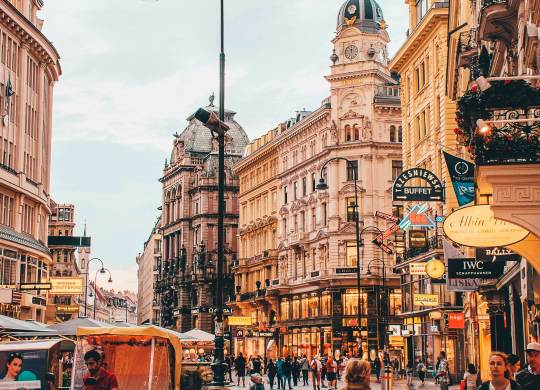How to arrange a trip to Austria. Everything about visa, transport and tourism
Table of contents
- Do I need a tourist visa for Austria?
- Requirements for a tourist visa to Austria
- How to apply for a tourist visa to Austria?
- Where can I go with an Austrian tourist visa?
- How long can I stay in Austria on a tourist visa?
- How long does it take to obtain a tourist visa for Austria?
- What to see and do in Austria
- Austria in practice
- Prices in Austria

What is Austria like? Between gorgeous ski resorts, mountain views, incredible lakes, and great historic cities, Austria seems like the perfect destination for an exciting trip. Being in the heart of Europe, you'll be just minutes away from other European countries. Not to mention, you can enjoy the best-baked goods in Austria's famous cafes.
Not everyone needs a tourist visa, but most foreigners need one depending on several factors. The visa application process is a bit complicated, so below you will find all the information you need on whether or not you need a visa, as well as a detailed explanation of the requirements for a tourist visa in Austria.
In addition to beautiful nature and popular ski resorts, Austria has a lot to offer tourists, with its strong traditions and a capital city with a rich history, but also a dynamic present. Travelers will admire the pure landscapes of Tyrol with its blooming chalets in the snow-capped mountains, stop by Viennese cafes, marvel at baroque castles along the way, and marvel at concerts at the prestigious Salzburg Festival.
Read more about Austrian citizenship by investment, as well as the benefits, requirements and application procedure here.
The best places to visit in Austria: the main sights to see and do - find here.
Do I need a tourist visa for Austria?
You may need a visa depending on where you are from, why you are going to Austria, and for how long. If you are a Schengen or EEA/EU resident, you will not need an Austrian tourist visa. Visitors from the US, Canada, Japan, New Zealand, Australia, the Principality of Andorra, the Republic of San Marino, or any other country with a visa agreement with Austria may also visit Austria without a visa for up to 90 days.
Requirements for a tourist visa to Austria
When applying for a tourist visa, you need to prepare certain documents. To apply for a visa, you will need:
- Passport
Please make sure that your passport is valid at the time of application. You must have a passport that has been issued within the last 10 years and that does not expire at the time of your visit. Your passport should also have two blank pages.
- Visa application form
You must print out the form online, fill it out with your personal information and sign it. You must then attach the form to your documents (in the case of a minor child, parents/legal guardians must sign).
- Passport photos
You must have two recent photographs with your documents. Photos must comply with Schengen visa photo rules.
- Schengen travel insurance
You must have travel insurance for €30,000. Schengen travel insurance must cover any medical problems or emergencies that may arise.
- Proof of residence in Austria
You must provide proof that you have accommodation for the duration of your stay. This can be a hotel reservation or a rental agreement.
- Proof of financial stability
To be issued a visa, you must provide proof that you can financially secure your stay in Austria.
- Letter of intent
You must also write a letter of intent in which you state the reason for your visit, and the duration of your stay and briefly explain your travel plans.
- Visa fees
- When applying for a tourist visa to Austria, you must pay the fee and enclose a receipt with your documents. The visa fee depends on your profile and the type of visa.
Additional documents:
Copies of your previous Schengen visa. If you have already obtained a Schengen visa, you should also attach copies to your documents.
Invitation letter. You must provide proof of invitation if a family member or friend has invited you to Austria.
Employment contract. If you are employed, you have to submit your employment contract along with the rest of your documents.
Remember: all of your documents must be in English or German, if not, you have to translate them. The translation must be done by a certified translator.
How to apply for a tourist visa to Austria?
When applying for a Schengen tourist visa, you need to follow a few simple steps:
1. Download the visa application form. The first step is to fill out the form and make sure it is ready to use.
2. Gather all your documents. Make sure that all of the above documents are ready and up to date.
3. Make an appointment. You can't just submit your documents when you are ready, you must make an appointment at the embassy/consulate and submit them.
4. Prepare for your interview. You will most likely be asked for an interview where you will answer a few questions about yourself and your trip.
5. Wait for an answer. After you apply, you will have to wait to be told whether or not you received a visa.
Where can I go with an Austrian tourist visa?
With an Austrian tourist visa, you can travel to any country in the Schengen area as long as your visa is valid. The Schengen area consists of 26 European countries, and with a Schengen visa, you can move freely between these countries. If you plan to visit countries other than Austria, you should always apply for a visa at the Austrian mission, as this is your main destination.
How long can I stay in Austria on a tourist visa?
Schengen tourist visas are valid for up to 90 days within 180 days. If you plan to visit other Schengen countries, these days also count.
How long does it take to obtain a tourist visa for Austria?
In most cases, it can take up to 15 days to process your application. In some cases, it may take longer, but you will be informed of any issues that arise. Be sure to check your email as the embassy will let you know if your visa is approved. You can then pick up your visa or the embassy will send it to you by courier.
What to see and do in Austria
Austria is a highly cultural destination, but it's also a country where nature is gorgeous. Its central location makes the country an easy and exciting vacation destination.
Vienna, the country's capital, has its own identity characterized by the rich architecture and the famous Danube River: visit the old city center, St. Stephen's Cathedral, the Donaupark, the Kertnerstrasse pedestrian street, the imperial palace, the historic art museum, the opera house, etc., not forgetting a tour of Vienna's cafes.
Salzburg, too, is full of treasures: baroque churches, squares, fountains, and many places dedicated to Mozart, whose homeland it is. If you get the chance, don't miss the International Festival in July and August, which celebrates his music. Or take the Grossglockner Panorama Trail for breathtaking scenery, including the summit of the same name overlooking the Pasterze Glacier.
Tyrol is another gem, with its green valleys dotted with dolled-up villages, emerald lakes framed by peaks, and winter sports resorts that ski enthusiasts will love.
Linz is a deeply industrialized city with plenty of jobs, but it's also the most closed and austere of Austria's cities.
Graz is a mostly university city where life is cheaper, with a very youthful atmosphere.
Austria in practice
Several international airports serve airlines from many European countries. Austria is also very easy to get to by train or car, as the road and rail networks are very efficient. For EU citizens an ID card is sufficient.
The budget of an average stay can match the budget in France: dinner costs less than 30 euros, and a double room costs about 100 euros. These prices are higher in Vienna and Salzburg. However, do not forget to include in your budget the purchase of tickets to museums and other historical monuments, which are pretty expensive.
For traveling around the country, there are many modes of transport at your disposal that you can adapt to your budget or needs: domestic flights, comfortable and quite frequent trains, buses for short trips, streetcars in the cities, boats on the Danube, not to mention bicycles that you can rent to travel along the numerous bike paths of the country.
Prices in Austria
Depending on the city, prices may vary. Tipping is not taxed and is about 10%, it is not obligatory, but you should leave it. Transportation in Austria is expensive if you buy it one way (about 2 euros per trip, which includes all the vehicles you need to use for about two and a half hours), but if you buy it on passes, it's pretty cheap and it runs well, very regular.
Shopping is a different world. You have to pay attention to prices for two reasons. First, the offers are often a rip-off: either the price is higher than the item in normal circumstances, or the item comes in smaller quantities. But what's important is that prices are quoted sometimes per kilogram, sometimes per 100 grams (in the case of meat or fish), sometimes per a certain number of grams, and sometimes per piece. You have to be careful.
Recommended articles
3 min
Travels
3 min
Travels
5 min
Residence permit
5 min
Travels
All materials and articles are owned by VisitWorld.Today and are protected by international intellectual property regulations. When using materials, approval from VisitWorld.Today is required.
